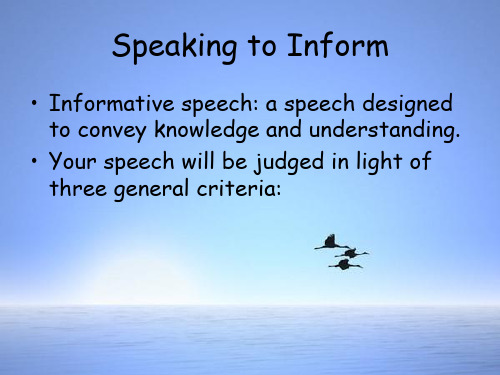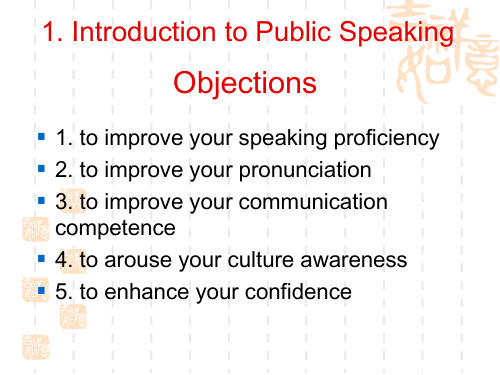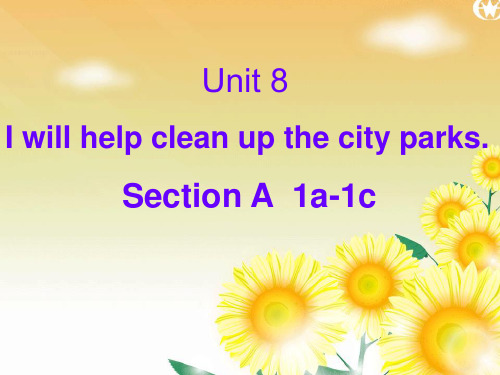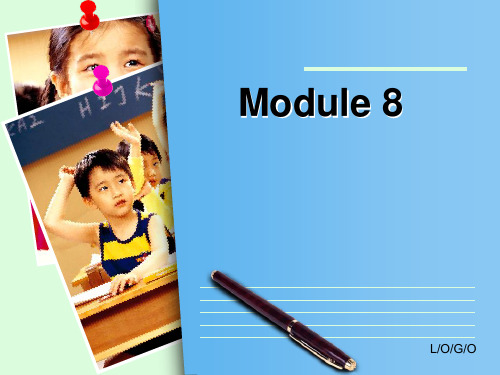英语演讲-Unit-8-Speaking-to-Inform最终版.ppt
【精品】八年级英语上册 Unit 8 English week Voca课件.ppt

• notice sb do sth • 注意到某人做了某事/ 经常做
• I noticed her crossing the road • 看见她正在过马路
• I noticed her cross the road . 看到她过马路了(她现在已经在马路对面,
看见她过马路的过程)
• 3. competition n. 比赛 • have a competition • 进行一次比赛 • 明天我们英语课上将进行一次比赛。 • We will have a competition in
English class tomorrow. • compete v.竞争 • compete with sb.
• confidence n. 自信 • have confidence in • 对…有信心 • 大卫对他的画画很有信心。 • Dave has confidence in his drawing.
• advise v. 建议 • advise sb to do sth
建议某人做某事 • 我们老师建议我通过多讲来学习英语。 • My teacher advised me to learn
• 6. He didn’t give any _a_d_v_i_c_e___(advise ) to his friends.
• 7. I don’t have much _c_o_n_f_id_e_n_c_e_ • (confidently) in English.
• 8. It is a good _c_h_o_i_c_e_____
• 12. opinion n. 意见,想法= • view/ idea • in one’s opinion 依某人看 • In his opinion, Linda is a nice girl.
英语演讲的艺术week six

Examples of Specific Purpose Statements for Informative Speeches about Objects • To inform my audience about geological features of the Gobi Desert. • To inform my audience about the latest developments in computer technology. • To inform my audience about the craftsmanship of Xiang embroidery.
• If you focus on the major principles or techniques involved in performing the process, you’ll organize your speech in topical order. Each main point will deal with a separate principle or technique. Example-see APS pages 180-181.
• If your specific purpose is to recount the history of an event, you’ll organize your speech in chronological order, relating the incidents one after another in the order they occurred. Example-see APS page 181.
Speeches about Events
• Event: anything that happens is regarded as happening. • The following are examples of suitable subjects: insomnia marriage World Cup Battle of Red Cliffs tsunami cyber crime
英语演讲汇总ppt

Lecture 3 Impromptu Speech
The situations for impromptu speech
To tell a story on the spot Give a toast at a gathering To respond to a question To present your opinion To explain a concept So the vast majority of public speaking will be impromptu.
Speech structure
1.Opening Open by addressing the Chairman or Master of Ceremonies Brief introduction/ opening sentence---attention getting. 2. Body Cover the main points (try to find 1or 2 central themes) Use clearly worded simple sentences and try to link the theme. 3. Conclusion Be brief and look for an elegant closing that links back to the opening. End by acknowledging the Chairman or Master of Ceremonies
Questions
1.What is public speaking? one form of public communication a formal presentation made by a speaker to an audience 2. Why should we learn public speaking? Practical benefits to learn about effective persuasive strategies to improve your personal interactions and relationship
英语演讲(2021精选文档)

2. Why Learn Public Speaking?
4) To help students develop critical thinking skills. Critical thinking consists of a mental process of analyzing or evaluating information, particularly statements or propositions that people have offered as true. It forms a process of reflecting upon the meaning of statements, examining the offered evidence and reasoning, and forming judgments about the facts.
Public speaking is the way of making your ideas public, of sharing them with other people and influencing them.
-- by Professor Stephen Lucas
Unit 1 Introducing 1. What is public speaking? 2. Why learn public speaking? 3. Types of public speaking
Unit 1 Introducing Public Speaking
1. What Is Public Speaking?
Unit 1 Introducing Public Speaking
unit8N2说课课件

Part 3 Analysis of learning ways
1. Listening, speaking, reading and writing.
2. Working in pairs and in groups.
Step 9. Homework.
Make a survey “ what would your family members like to do to help others?” and then write a report.
Part 6. Blackboard Design Unit 8
Step 8. Summary. 1. New words and phrases: homeless , hunger clean up, cheer up, give out, help with 2. Sentences: I’d like to work outside. You could give out food at a food bank. I will help clean the city parks. 3. Learn to express offering help.
Sample dialogue 2: A: I’d like to work in the
hospital. B: Then you could help
cheer up the sick people.
Make up your own conversations like this.
A: I’d like….
新编剑桥商务英语unit8省名师优质课赛课获奖课件市赛课一等奖课件

S: Yes, but I can’t afford to take any more tome off this month. I’m already behind.
M: But these are online. You don’t need to go away.
interactive;
More flexible, may do it any More direct, closer, hearing
time and anywhere
the voice of the other
person in real time;
More natural, feel better
2. Imagine you are a training manager and you receive information on the two courses below. Read these statements from people at your company and decide which course would suit them.
Duration: Approx. 2 hours.
This is an online product and for a single user.
BUY
NOW
Course price: £50.00 + £8.75(VAT)= £58.75
‘I’m responsible for then people but I find it hard to get the best from them.’
Unit 8 Listening and speaking
Unit 8 Listening and speaking整体设计教学内容分析This period of the unit focuses on listening skills. The topic of the lesson is the Web. Due to the fact that students are very interested in the internet, the lesson will be started by discussing the use of the internet, which can not only stimulate students’background knowledge but also lead students to predict the history of the internet.三维目标设计Knowledge and skills1.To make students understand some new words and expressions in this period.2.To find the information needed on English websites.3.To improve students’ listening ability by intensive and extensive listening.4.To develop student s’ communicative ability.Process and methodse the picture on page 129 to lead a topic to arouse students’ interest.2.During Pre-listening, some questions related to the internet and websites are offered to let thestudents find them by using the internet, and this may help students make better preparations for listening.3.In While-listening, introduce the history of internet to add the knowledge.4.For Post-listening, students are required to use the internet to find some answers.Emotion, attitude and value1.To develop student s’ competence of prediction and guessing.2.To help students hold the right attitudes towards the internet and gain knowledge about theinternet.3.To experience the pleasure of surfing on the internet.教学方法municative language teachingCommunicative language teaching is an approach to the teaching of second and foreign languages that emphasizes learning to communicate through interaction in the target language. More activities, such as interviews, language exchanges, information gap and pair work, will be designed in order to achieve the goals.2.Task-based language teachingThe teaching material deals with the theme of internet. So, the students using the internet and finding the answers by themselves may help the teaching goals achieve.教学重难点1.To practice intensive and extensive listening skills.2.To help some students overcome their nervousness when faced with internet.教学过程Step 1 Lead inAsk the questions related to the topic.What can you see on the picture?If you wan to surf the internet, we must know the related websites. What’s the definition of the websites?----Please use the internet and try to find the answer by yourselves.(A website is a collection of related web pages containing images, videos or other digital assets. A website is hosted on at least one web server, accessible via a network such as the internet.)Step 2 Pre-listening1.Ask students to answer these questions:Which website can you visit to do these things?a)find out what’s going on in your b)look for a c) find out world d) get information for a famous e) write to your friends by f) buy Step 3 While-listeningT: We can learn about all kinds of knowledge we want to know on the internet. We can look through the internet to find what we want to know. The internet changes our life and makes life more convenient. Nowadays, we have many ways to get access to the internet. Please tell me how many ways you know?------(computer, mobile phone, Ipad, even TV set)Give this table to students and introduce something about history of internet.Try to use the internet to find the answers and exchange your views with your partner.a)How did the internet begin?b)What did the Pentagon think of doing and why it happened in the 1960s?c)When was it called the internet?d)What can people use the internet for now?e)What else can the internet be used for in the future?Step 4 Post-listeningWork in pairs. Try to send an email to your English teacher. The email address is py@Step 5 HomeworkUse the internet and try to find some information about a movie named “A Beautiful Mind”, write an introduction about this movie.课后反思网络应用中的英文缩写含义,很多学生不是很清楚,如果下一次课中时间充裕,可以增加一些英文缩写含义的介绍,比如ISO, BBS, FTP等等,这样更加有利于学生了解和应用英特网。
新编剑桥商务英语unit_8
Face-to-face training
- you get new ideas from other people on the course - networking - you can ask the tutor questions
Listening script
Can you think of any more arguments for and against online training?
Online training Relaxed and more comfortable; More flexible, may do it any time and anywhere Face-to-face training More personal and interactive; More direct, closer, hearing the voice of the other person in real time; More natural, feel better
THE EFFECTIVE LEADER TEAM BUILDING
training courses
THE EFFECTIVE LEADER This online course will make you a more effective leader – whether you’re responsible for leading a project, a team, a unit, a department or even a company! Whatever your role, we’re assuming you must lead people in order to achieve results. This course focuses on ACTION you can take to ensure people follow you so you get results. Duration: Approx. 2 hours. This is an online product and for a single user. Course price: £50.00 + £8.75(VAT)= £58.75 TEAM BUILDING Organisations have always relied on teams in some form. But now there is more emphasis on groups of people working in teams, taking joint responsibility for achieving standards and meeting objectives. This course explores the key factors that make teams effective and the skills required to build, strengthen and maintain the team. Duration: Approx. 2 hours. This is an online product and for a single user. Course price: £50.00 + £8.75(VAT)= £58.75
English Presentation英语演讲
I learned last May that you have to be careful in speaking to a group of professional communicators. After I conducted a writer' s workshop at the Toronto Conference of the International Association of Business Communicators, Janine Lichaczwrote asked me to speak here tonight and used the communication techniques I had recommended. She even included a footnote citing my lecture. I am susceptible to good communication and to flattery so I am pleased to be with you to discuss your topic for the evening, the use of language in the art of speech writing.I suppose we must begin by shaking our heads, woefully, over the sad state of language today, whether in formal speeches, casual conversation, or in writing. Most of us in this room no doubt agree with the generally negative tone of Time Magazine's year-end assessmentMay I proceed to the next slide,please?I think we can move on to the nextslide.Let me show you the next slide.Now, we can go on to the next slide.Next slide, please.Next, please.Next !用英语演讲PPT 2/2 讲解图表Present charts in English一、图表作文写作常识1、图形各类及概述法:泛指一份数据图表:a data graph(曲线图) / chart / diagram /illustration / table饼图: pie chart直方图或柱形图: bar chart / histogram趋势曲线图: line chart / curve diagram表格图: table流程图或过程图: flow chart / sequence diagram程序图: processing / procedures diagram2、常用的描述用法The table / chart / diagram / graph shows (that) ...According to the table / chart / diagram / graph ...As (is) shown in the table / chart / diagram / graph ...As can be seen from the table / chart / diagram / graph / figures,figures / statistics shows (that) ...It can be seen from the figures / statistics ...We can see from the figures / statistics ...It is clear from the figures / statistics ...It is apparent from the figures / statistics / table / chart / diagramIt is apparent from the figures / statistics / table / chart / diagram / graph figures (that) ...table / chart / diagram / graph shows / describes / illustrates ...3、图表中的数据(Data)具体表达法数据(Data)在某一个时间段固定不变: fixed in time在一系列的时间段中转变: changes over time持续变化的data在不同情况下:增加: increase / raise / rise / go up ...减少: decrease / grow down / drop / fall ...波动: fluctuate / rebound / undulate / wave ...稳定: remain stable / stabilize / level off ...最常用的两种表达式:动词+副词形式(Verb + Adverb form)形容词+名词形式(Adjective + Noun form)4、常用的句子1. Right, let’s get started.2. Let me introduce myself.3. I’ve divided my presentation into three main parts.4. Just to give you a brief overview.5. I’ll be saying more about this in a minute.6. I’m sure the implications of this are clear to all of us.7. There’s an important point to be made here.8. OK, let’s move on. (go on to make your next point)9. As you can see, the figures speak for themselves.10. To go back to what I was saying earlier.11. Are there any questions you’d like to ask at this point?12. I’d like to look at this in more detail.13. Let’s put this into perspective. (to explain it this way)14. Perhaps I should expand on that a little.15. To digress for a moment? (to depart from your plan)16. So, to sum up?17. That brings me to the end of my talk.18. Thank you. I’m sure you all have lots of questions.二、相关常用词组1、主章开头二、相关常用词组1、主章开头图表类型: table(表格)、chart(图表)、diagram(图标)、graph(多指曲线图)、column chart(柱状图)、pie graph(饼图)、tree diagram(树形图)描述: show、describe、illustrate、can be seen from、 clear、apparent、reveal、represent内容: figure、statistic、number、percentage、proportion2、表示数据变化的单词或者词组rapid / rapidly 迅速的,飞快的,险峻的dramatic / dramatically 戏剧性的,生动的significant / significantly 有意义的,重大的,重要的shart / sharply 锐利的,明显的,急剧的steep / steeply 急剧升降的steady / steadily 稳固的,坚定不移的gradual / gradually 渐进的,逐渐的slow / slowly 缓慢的,不活跃的slight / slightly 稍微的、略微地stable / stably 稳定的3、其它在描述中的常用到的词significant changes 图中一些较大变化noticeable trend 明显趋势during the same period 在同一时期grow / grew 增长distribute 分布unequally 不相等地in the case of 在……的情况下in terms of / in respect of / regarding 在……方面in contrast 相反,大不相同government policy 政府政策market forces 市场力量measure n. 尺寸,方法,措施 v. 估量,调节forecast n. 预测,预见 v. 猜测三、图表描述套句精选1、the table shows the changes in the number of ……over the period from …… to ……该表格描述了在……年之……年间……数量的变化2、the bar chart illustrates that ……该柱状图展示了……3、the graph provides some interesting data regarding ……该图为我们提供了有关……有趣数据4、the diagram shows (that)……该图向我们展示了……5、the pie graph depicts (that)……该圆形图揭示了……6、this is a cure graph which describes the trend of ……这个曲线图描述了……的趋势7、the figures / statistics show (that)……数据(字)表明……8、the tree diagram reveals how ……该树型图向我们揭示了如何……9、the data / statistics show (that)……该数据(字)可以这样理解……10、the data / statistics / figures lead us to the conclusion that ……这些数据资料令我们得出结论……11、as is shown / demonstrated / exhibited in the diagram / graph / chart / table ……如图所示……12、according to the chart / figures ……根据这些表(数字)……13、as is shown in the table……如表格所示……14、as can be seen from the diagram, great changes have taken place in ……从图中看出,……发生了巨大变化15、from the table / chart / diagram / figure,we can see clearly that …… or it is clear / apparent from the chart that ……从图表我们可以很清楚(明显)看到……16、this is a graph which illustrates ……这个图表向我们展示了……17、this table shows the changing proportion of a & b from …… to ……该表格描述了……年到……年间a与b的比例关系18、the graph, presented in a pie chart, shows the general trend in ……该图以圆形图形式描述了……总的趋势19、this is a column chart showing ……这是个柱形图,描述了……20、as can be seen from the graph, the two curves show the fluctuation of ……如图所示,两条曲线描述了……的波动情况21、over the period from …… to ……, the …… remained same level在……至……期间,……基本不变22、in the year between …… and ……在……年到……期间……23、in the 3 years spanning from 1995 through 1998 ……1995年至1998三年里……24、from then on / from this time onwards ……从那时起……25、the number of …… remained steady / stable from (month / year) to (month / year)……月(年)至……月(年)……的数量基本不变26、the number sharply went up to ……数据急剧上升至……27、the percentage of ……stayed the same between ……and …………至……期间……的比率维持不变28、the figures peaked at ……in (month / year)……的数目在……月(年)达到顶点,为……29、the percentage remained steady at ……比率维持在……30、the percentage of …… is slightly larger / smaller than that of …………的比例比……的比例略高(低)31、there is not a great deal of difference between …… and …………与……的区别不大32、the graphs show a threefold increase in the number of ……该图表表明……的数目增长了三倍。
unit8_演讲
Target management
• The overall goal down into one easy target set your goals like into a pyramid, tower is your goal in life, your goal and to achieve and did everything must be directed to your life mesh.
• All in all, hope you have a balanced view of life and study. • I think happiness is an attitude,
Good interpersonal relationship
• Success means the participation of others
faith
• the moment you think about giving up,think of the reason why you held on so long.——每当你想放弃的时候,想一想是 什么支撑着你一路坚持。
modest
• 1, do you put the continuous learning more knowledge as you duties?
• 2, if you have a habit: for you have not familiar problems comments? • 3 and when you need knowledge, you know how to look for? • The more successful people, the more they will seize all can be the opportunity to learn.
- 1、下载文档前请自行甄别文档内容的完整性,平台不提供额外的编辑、内容补充、找答案等附加服务。
- 2、"仅部分预览"的文档,不可在线预览部分如存在完整性等问题,可反馈申请退款(可完整预览的文档不适用该条件!)。
- 3、如文档侵犯您的权益,请联系客服反馈,我们会尽快为您处理(人工客服工作时间:9:00-18:30)。
Unit 8 Speaking to inform
精心整理
1
The ultimate goal of an informative speech is to convey knowledge and help the audience better understand your communication message. Knowing how to construct an effective informative speech will benefit anyone trying to communicate information in the classroom, business sector, military and nonprofit industry.
If your specific purpose pertains to showing how some event led to something, then you could use a “causal” order.
A third option is choosing a “topical” order in which you can talk about event aspects in any logical order.
Unit 8 Speaking to Inform
精心整理
2
1. The first step is to decide an appropriate topic. Remember that an informative speech does not advocate a political position, cause, way of thinking or action to take. Think of yourself as a teacher who will be simply presenting the facts in an objective way.
If you are stumped for a topic, a great place to look for topics is in the mass media. Look for what is being heavily covered and then speak about some related aspects. This ensures that you find a topic that may already be on the minds of your audience.
Unit 8 Speaking to Inform
精心整理
5
4. It is now time to begin your outline. How you organize your outline will depend on your speech’s classification.
If it is a speech on an event, you could use a “chronological” order in which you talk about incidents in the order that they actually occurred.
Another way to arrange an informative speech about an object is to use a “spatial” order. This is most common if you are describing a region on a map.
(1) speeches about events (2) speeches about objects (3) speeches about concepts (4) speeches about processes
Unit 8 Speaking to Inform
decide on the category, you must then develop your specific purpose.
Depending on your course structure and theoretical perspective, your specific purpose will either be “speaker-centered” or “audiencecentered”. If it is speaker-centered, then your specific purpose will usually begin as, “To inform my audience about...” in contrast to an audiencecentered speech which typically begins, “At the end of my speech, I want my audience to ...”
Unit 8 Speaking to Inform
精心整理
6
5. After you have decided on your appropriate order, you should always utilize external sources in order to backup your central idea and main points. Make sure you either verbally cite these sources or include the sources in your PowerPoint slides, while you are presenting. Remember that it is important to have credibility in whatever setting you are giving an informative speech.
Unit 8 Speaking to Inform
精心整理
3
2. Next, you should decide on how you would classify your speech.
Most public speaking courses divide informative speeches into four categories:
